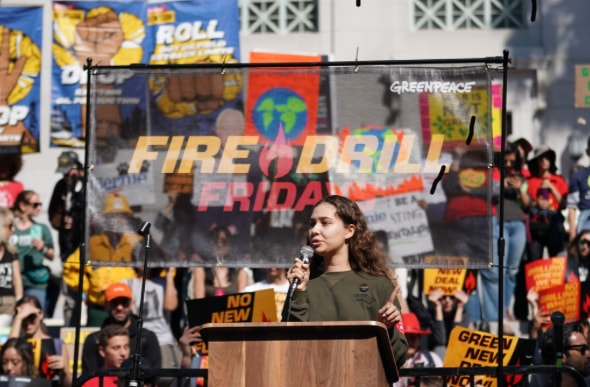WEA Joins Thousands of Climate Allies in the March to End Fossil Fuels
by Fiona McLeod, WEA's Communications and Development Manager
This month, WEA joined 75,000 other climate advocates for the March to End Fossil Fuels in New York City, as part of Climate Week NYC. Surrounded by the echoing sounds of spirited chanting, we marched with our colleagues, friends, and partners in the Feminist Bloc to demand an end to extraction and a deeper investment in care-oriented, women-led climate solutions worldwide.

“It was incredible to share space with so many like-minded people,” said Annesha Chowdhury, WEA’s Senior Program Manager, reflecting on her time at the March. “The energy was infectious, and the message was loud and clear: it’s time to divest from fossil fuels and transition to sustainable, care-focused climate solutions that make way for a fair and equitable future for all.”
WEA is proud to have been an endorsing partner of the 2023 March to End Fossil Fuels, alongside a coalition of organizations and allies seeking to halt new fossil fuel development, phase out existing oil and gas production, and accelerate the transition to renewable and sustainable energy sources. For WEA and our partners in the global Feminist Green New Deal coalition, this movement is both about addressing the climate emergency and advocating for intersectional solutions that attend to the disproportionate impacts of extractive industry and fossil fuel-related pollution on women around the world.

The Oil and Gas Industry Fuels Gender-Based Violence
The deep interconnections between environmental violence; gender-based violence; and women’s sexual and reproductive health, safety, and wellbeing are a testament to the importance of centering intersectional approaches in our global transition away from fossil fuels:
- Toxic contaminants produced by burning fossil fuels enter our bodies through the air we breathe, the water we drink, and the food we eat, and lead to a range of health impacts — including detrimental harm to women's reproductive systems.
- The frontline communities most impacted by fossil fuel-related pollution are disproportionately communities of color and those with lower incomes, and as climate change intensifies, it amplifies these disparities — with Black and Indigenous women being the most severely impacted.
- Historically, the presence of "man camps" set up to house oil and gas industry workers (often located on or near Indigenous territories) result in increased sexual violence and exploitation of women and girls.
Divesting from fossil fuels and investing in climate-friendly alternatives must center frontline women’s leadership and women-led organizations, initiatives, and care-centered solutions.
WEA’s Role in the Movement for a Just Transition
It is globally recognized that women’s leadership is critical to addressing the climate crisis. Countries where women have higher social and political status produce 12 percent fewer greenhouse gas emissions and have more protected land areas than those countries where women are disenfranchised. Increasing evidence shows that women’s empowerment, education, and leadership is instrumental in reducing atmospheric CO2.
Yet women and girls are often treated as “beneficiaries,” rather than change agents with a seat at decision-making tables. The average representation of women in national and global climate negotiating bodies is below 30%, and women are denied the resources, training, and networking opportunities they need to lead at every turn. According to the Climate Gender Equity Fund, “While climate finance flows amounted to more than US$600Bn in 2021, only 1% integrated a gender lens — revealing the vast opportunity for change and growth.”
That’s where WEA comes in: to bridge these critical gaps in the climate movement, support leaders poised to expand their community-based solutions, and build regional and national networks to accelerate the transition to clean energy and a more sustainable future.
WEA Leaders across the U.S. are are the forefront of the movement to end new fossil fuel development and ensure a just transition:
- At age 19, Nalleli Cobo led her community to successfully shut down a toxic oil well located just 30 feet from her front door. Since then, she has advocated for frontline communities impacted by fossil fuel-related pollution across the country.
- Brady Seals is helping to illuminate the dangerous health and climate impacts of gas stoves and advocate for cleaner cooking options in our homes and communities, through her work at the Rocky Mountain Institute.
- Last year, Dr. Crystal Cavalier-Keck and Grace Tuttle co-led a mobilization to stop the Mountain Valley Pipeline. Over 600 people joined outside the U.S. Capitol to call for an end to the dirty pipeline deal.

What’s Next
It's easy to feel overwhelmed and powerless in the face of climate change, the oil and gas industry’s tight grip on political systems and policies, and the profound environmental and bodily harm caused by extractive industry and toxic pollution. But WEA’s global alliance of grassroots leaders working to protect the earth and our communities remind us that while the challenges are daunting, we are not alone in this work.
The incredible turnout at the March to End Fossil Fuels — and all of the illuminating, inspiring, conversations and panels held during Climate Week NYC — give us reason to feel hopeful that a cleaner, more sustainable future is in sight. And now, as Climate Week has come to a close, we are eager to keep the momentum going.
After all, the only way to reach a just, equitable, clean energy future is to keep moving forward: one step at a time.
For more information on the intersections between environmental and gender-based violence perpetuated by the fossil fuel industry, read WEA’s Violence on the Land, Violence on our Bodies report. This report and toolkit emerged from WEA’s multi-year partnership with the Native Youth Sexual Health Network (NYSHN), and centers the experiences and resistance efforts of Indigenous women and young people in order to expose and curtail the impacts of extractive industries on their communities and lands.
